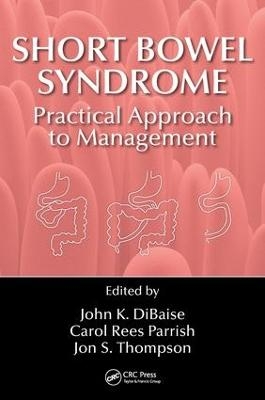
Short Bowel Syndrome
Crc Press Inc (Verlag)
978-1-4987-2078-6 (ISBN)
The use of growth factors, which is likely in the future to become increasingly important in promoting intestinal structural adaptation, is extensively discussed. Special emphasis is given to the psychosocial aspects of the quality of life of patients, including support groups. Emphasis is also given to the importance of an experienced multidisciplinary team in caring for these patients.
This book is particularly timely given the recent advances in the management of Short Bowel Syndrome, including the availability of pharmacologic agents to enhance intestinal absorption, refinements in parenteral nutrition, and surgical procedures designed to eliminate the need for parenteral nutrition support.
The goal of this international, interdisciplinary book is to bring the subject of Short Bowel Syndrome to a wide audience. A wide range of specialists have contributed to this book to provide various viewpoints on the state-of-the-art care of those with this condition.
Edited by John K. DiBaise, MD, professor, Mayo Clinic, Scottsdale, Arizona, USA Carol Rees Parrish, MS, RD, University of Virginia Health System, Charlottesville, USA Jon S. Thompson, MD, professor of surgery, University of Nebraska Medical Center, Omaha, USA
Short Bowel Syndrome: Definition, Classification, Etiology, Epidemiology, Survival, and Costs. Psychological, Social, and Quality of Life Considerations in Short Bowel Syndrome. Short Bowel Syndrome: Anatomical and Physiological Considerations. Intestinal Adaptation: The Contemporary Treatment Goal for Short Bowel Syndrome. Diarrhea in Short Bowel Syndrome. Electrolyte and Acid-Base Disturbances. Cholelithiasis and Nephrolithiasis. Metabolic Bone Disease in Adults with Short Bowel Syndrome. Clinical and Nutritional Assessment in the Patient with Short Bowel Syndrome. Diet Considerations in Short Bowel Syndrome. Maintaining Hydration in the Short Bowel Patient. Vitamins: Supplementation and Monitoring. Management of Trace Elements in Short Bowel Syndrome. Enteral Feeding in Short Bowel Syndrome. Parenteral Nutrition for Short Bowel Syndrome: Practical Aspects. Drug Delivery and Bioavailability in Short Bowel Syndrome. The Role of Antimotility and Antisecretory Agents in the Management of Short Bowel Syndrome. Luminally Active Therapies: Pancreatic Enzymes, Bile Acids, Bile Acid Binders, Antimicrobials, Probiotics, and Prebiotics in Short Bowel Syndrome. Glucagon-Like Peptide-2 in Short Bowel Syndrome. Utility of Growth Hormone and Other Potential Agents to Restore Enteral Autonomy in Short Bowel Syndrome. Surgical Considerations in the Short Bowel Syndrome. Ostomy, Fistula, and Skin Management. Autologous Gastrointestinal Reconstruction. Intestinal Transplantation. Home Parenteral Nutrition Initiation, Monitoring, and Weaning. Intestinal Failure-Associated Liver Disease. Central Venous Catheter Complications: Management and Prevention. Meeting the Unmet Needs of Home Parenteral and Enteral Nutrition Consumers: Education, Networking, and Support. Patient and Caregiver Perspectives: Learn and Live!
| Erscheinungsdatum | 24.05.2016 |
|---|---|
| Zusatzinfo | 95 Tables, black and white; 30 Illustrations, color; 73 Illustrations, black and white |
| Verlagsort | Bosa Roca |
| Sprache | englisch |
| Maße | 178 x 254 mm |
| Gewicht | 975 g |
| Themenwelt | Medizin / Pharmazie ► Gesundheitsfachberufe ► Diätassistenz / Ernährungsberatung |
| Medizinische Fachgebiete ► Chirurgie ► Viszeralchirurgie | |
| Medizinische Fachgebiete ► Innere Medizin ► Gastroenterologie | |
| ISBN-10 | 1-4987-2078-1 / 1498720781 |
| ISBN-13 | 978-1-4987-2078-6 / 9781498720786 |
| Zustand | Neuware |
| Haben Sie eine Frage zum Produkt? |
aus dem Bereich


